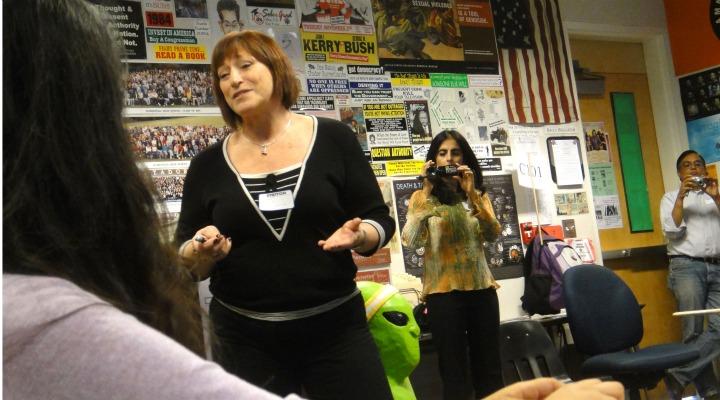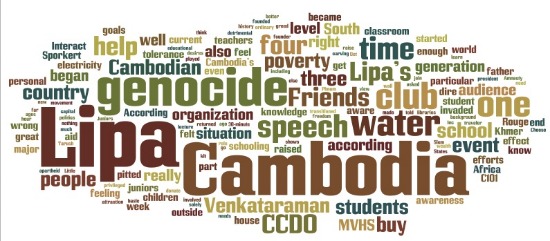
$220 can buy you a water well in Cambodia or 40 Chipotle burritos.
$25 can buy you a Cambodian child’s school starter kit or five Venti lattes from Starbucks.
$1,500 can buy an entire house in Cambodia or five couples prom night bids.
Jenni Lipa, president and founder of Friends of Cambodian Child’s Dream Organization (CCDO) Inc., utilized such examples as a part of her motivational speech to the filled C101 classroom on Oct. 21. Juniors Tarush Sinha, Aditya Subramanian, Erika Sporkert and Guhan Venkataraman organized the event through the official school club Amnesty International, but are in the process of creating their own club in conjunction with Interact. The new club plans to get started through Interact and will focus solely on Cambodia, including awareness of the genocide, promotion of tolerance and efforts to aid the organization of Friends of CCDO. Thanks to the speaker event, the young club has already begun to reach its goals by fundraising $280 for Friends of CCDO.

The lesson of genocide and poverty — a detrimental mixture
“We really have to realize that we are the same inside out. We all have the same needs and desires and wants,” Lipa said in her 30-minute speech to the C101 audience.
Her speech about Cambodia touched upon everything from the current impoverished situation to the history of its genocide to ways in which high school students can and should help to aid the anti-poverty movement.
Lipa began the presentation with a historical timeline of Cambodia, beginning in 1975 when the Khmer Rouge invaded Phnom Penh, the capital of Cambodia. In 1979, the Vietnamese invaded to quell the Khmer Rouge regime and Cambodia finally received peace in 1999 when the UN Peace Corps intervened. In this time period, 2 million people were killed and 200,000 people fled the country.
While she inserted personal anecdotes of her experiences in the country after the chaos, Lipa’s enunciated voice gently spread her message of tolerance and awareness. According to Lipa, genocide has four simple causes: fear, power, wealth and greed.
There has been a major genocide, like the Darfur genocide, every decade since the 1940s and, according to Lipa, it has a post traumatic effect that is carried on from one generation to another.
“Brothers pitted against each other , families pitted against each other,” Lipa said. “[People] didn’t know who was right and who was wrong.”
Ultimately, this genocide played a major role in the current situation in Cambodia which, according to Lipa, is dire: limited access to water and sanitation, no plumbing system, very basic schooling, no electricity and a crowded classroom environment.
Finally, Lipa transitioned her speech to the organization she founded, Friends of CCDO, which strives to educate Cambodians in the hopes of breaking the poverty cycle. Since 2007, the non-government organization has also provided 350 water wells, three libraries, 400 children’s schooling, three playgrounds, school toilets, English teachers and additional income for overworked teachers.
In an effort to motivate the audience to join the cause, Lipa mentioned a couple of children outside of MVHS who had gone through great efforts to help.
[audio:https://elestoque.org/wp-content/uploads/2011/10/Jenni.mp3|titles=Lipa at a Cambodian school]
“Ordinary people can do the extraordinary. I am nothing out of the ordinary,” Lipa said. “Choose some kind of passion, say that’s what you want to do, and just do it.”
Lipa’s point of view
Lipa’s Jewish father had spent four years in a German prisoner war camp and was freed in 1945 by American troops. He returned to his home country of South Africa in 1948 right as the South African apartheid began. As her father got involved in politics, Lipa was born and brought up in South Africa with knowledge of freedom and genocide with this background. During this time, she learned the difference between right and wrong and soon became a knowledgeable traveler. Lipa was became aware of Cambodia’s particular cirumstances in July 2007 at Siem Reap, according the the Friends of CCDO website.
“For the most part, the [United States] is very secular in its news,” Lipa said. “You need to become aware of how privileged you are so you can always help someone else. The time that you play [with] games, you can spend that half an hour, once a week to do a little research on a third world country.”
[audio:https://elestoque.org/wp-content/uploads/2011/10/JenniGeneration.mp3|titles=Lipa’s view on the young generation today]
According to Lipa, students oftenlack the motivation or the opportunity to get started. She feels that the teenage generation of today is very much a “me generation” that lacks the feeling of giving.
“It’s a feeling that you cannot buy. It’s better than a pair of shoes,” Lipa said. “You know, it is a ripple effect, it is one child at a time, one step at a time, one village at a time … And that’s my theory. And it’s great, I love it.”

How the juniors’ are bridging Cambodia and MVHS
So far, the four club founders have recorded 40 books on three USB drives that will be sent over to the three villages of Khirimeanon, Tapang, and Phum Steung, in Cambodia as educational tools. They have also raised enough money to build a water wall in the name of MVHS that began being built a week ago.
All of the organizers felt the event last Friday was effective in its goals to teach the student population of the situation in Cambodia.
[audio:https://elestoque.org/wp-content/uploads/2011/10/Cambodia-Venkataraman-1.mp3|titles=Venkataram’s advocacy for this new club]
“It really shows people whats going on in the world because this genocide hasn’t really been in our textbooks at all,” Sporkert said. “I felt that there are a lot more important things that happen outside of what we learn.”
Venkataraman found even more golden coins of knowledge in Lipa’s speech.
“[Lipa told us] what we can do it help — on a personal level, on a student level, on a global level,” Venkataraman said.
The juniors feel a particular attraction to Cambodia because they feel it has been neglected even though Cambodia’s two pronged disaster of genocide and poverty is especially adverse.
“This [club] is [about] what I am doing to help this Cambodian person who is in dire poverty, who does not have electricity, who does not have a house, who does not have water, who does not have food to go on for a month or so,’” Venkataraman said.
At the end of Lipa’s speech, the four students asked the audience to donate anything they could. They also placed out Cambodian “skin carving art”, leather cutouts made by children from ages four to 18 from the Little Angels Orphanage in Cambodia, for students to purchase. At the end of the event, they had raised $280, enough to pay for a water well in Cambodia.
[audio:https://elestoque.org/wp-content/uploads/2011/10/Cambodia-Sinha.mp3|titles=Sinha’s view on the the aid to help Cambodia]
“If one lecture was able to raise one water well”, Venkataraman said, “then think of what we could be doing as one club.”


This work is licensed under a Creative Commons Attribution 3.0 Unported License.







